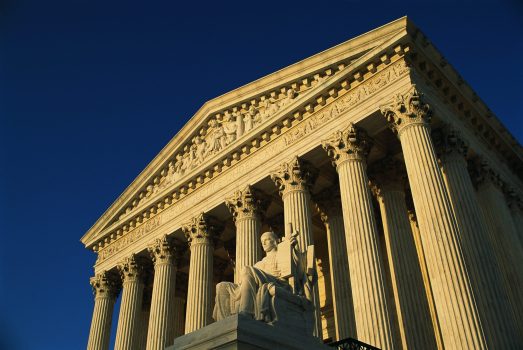
The U.S. Supreme Court heard arguments yesterday about whether to let stand a Wisconsin Supreme Court decision that protects the rights of workers employed by religiously affiliated organizations. Even a narrow ruling that reverses the Wisconsin court’s decision could allow religious exemptions to swallow the protections in statutes designed to protect workers.
The case, Catholic Charities Bureau v. Wisconsin Labor & Industry Review Commission, involves a challenge to the Wisconsin unemployment tax system that exempts churches and religiously affiliated organizations operated “primarily for religious purposes.” The plaintiffs – sub-entities of the Catholic Charities Bureau that run charitable service programs – claim that they should be entitled to the benefit of this exemption.
Americans United filed a friend-of-the-court brief in early March in support of Wisconsin, arguing that the Supreme Court should uphold the state court’s interpretation of its statute. The language of the statute is not unusual. Laws that provide limited exemptions for organizations engaging in religious activity are widespread. But these exemptions are intended to be just that – limited.
During oral argument, attorneys representing Catholic Charities and the U.S. Solicitor General’s Office advocated for nearly no limitations at all. They argued that a religious motive alone should be enough to qualify an organization for an exemption. The Becket Fund’s Eric Rassbach, for Catholic Charities, said that the test should be whether the organization was “discharging” a “duty that is owed” to God. Trump Administration Deputy Solicitor General Curtis Gannon, arguing for the same side, suggested that courts should consider only “sincerity” of religious belief and whether religious beliefs were the principal motive for the organization’s operation.
While various justices raised concerns about the Wisconsin Supreme Court’s decision, many of the justices also noted the issues with adopting a test as sweeping as the one Catholic Charities proposed. The justices pointed to the vast number of organizations that might be newly entitled to an exemption.
Chief Justice John Roberts asked: “What if you have a religion that thinks it’s a sin to eat meat, and … to promote eating of non-meat dinners, they open a [vegetarian] restaurant? Do they have a claim to be exempt from state taxes, food taxes, everything else?” And Justice Amy Coney Barrett seemed concerned that a test focused on motivations, as opposed to activities, would require the courts to wade into the thornier matter of defining religion.
Justice Ketanji Brown Jackson pointed out “purpose” does not necessarily mean “motivation.” She said, “You know, my pen serves a purpose; it allows me to write notes. And that has nothing to do with motivation.”
Instead, some justices seemed concerned that the Wisconsin Supreme Court’s approach – identifying certain types of activities that typify “religious purposes” – would potentially be a form of discrimination among religions. This is because, they said, such an approach would allow some religions but not others to qualify for exemptions.
But the notion that legislatures cannot meaningfully and in good faith distinguish between religious and nonreligious activities would be devastating to the structure and operation of laws governing taxes, property, discrimination, health care and religion itself. Unbounded exemptions from these laws – turning only on whether religiously-affiliated organizations can claim a religious motive for their activity (not a difficult task) – would create a two-tiered system of worker protections. And they would put organizations that comply with worker protections at a serious competitive disadvantage.
These harms would be widespread, given the large number of organizations that have a religious affiliation. For example, around 20% of hospitals in the United States are religiously affiliated. In addition, according to a conservative estimate, 1.2 million people work for religiously affiliated organizations. These numbers are growing.
As AU argued in its brief, legal distinctions between the religious and nonreligious activities of religious organizations have a long history, dating, in the United States, to the earliest state constitutions and even state laws that preceded the founding of our country. These distinctions were repeatedly relied on by courts, including the Supreme Court, throughout the 1800s. They have been firmly established in the nation’s laws. The religious exemptions are designed to protect churches and those organizations that are similar enough to churches in design and activity to receive the same protections. An opinion that suggests religious motive alone is enough to meet the statutory requirement of “religious purpose” would warp this design into a loophole for employers looking to avoid the law.
This would undermine, not enhance, religious liberty. It would do so in two ways: Employers who do not engage in religious activities would be able to impose their religious beliefs on their employees by depriving them of legal protections. And legislatures would be incentivized to remove from houses of worship the kinds of religious exemptions they have traditionally enjoyed to avoid the risk of exemptions sweeping too broadly.
Jess Zalph is a constitutional litigation fellow at Americans United.